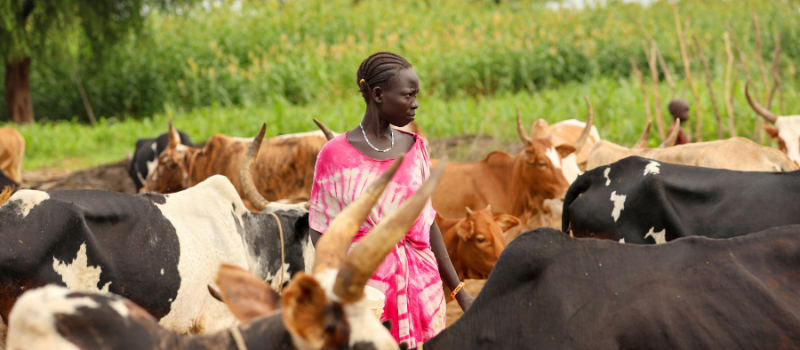"Working with both knowledge sources can provide research that is based on the context of location which make knowledge mobilization and action an easier process. After all, research without action or communication cannot be applied."
Earlier this year, Veterinarians Without Borders/Vétérinaires Sans Frontières' (VWB/VSF) announced its first ever Access to Care Award recipients — individuals from across Canada's territories that are already pursuing education in animal health, or are interested in learning skills such as pet first aid. This program was launched with the goal of increasing capacity for veterinary care across the North, where access to animal health care is significantly limited. In fact, in many remote communities, the closest veterinarian is a plane ride away. These awards, part of our Northern Animal Health Initiative, use a One Health model to prioritize the health of animals, people, and the environment simultaneously.
One of our bursary recipients, Enooyaq Sudlovenick, is a PhD student who is emulating the One Health model through her research on beluga whales. By combining Inuit and Inuvialuit knowledge with western science, Enooyaq — who was born and raised in Iqaluit, NU — is dedicated to understanding and preserving the health of belugas throughout Nunavut and the Northwest Territories. Currently in the fourth year of her PhD program at the University of Manitoba, Enooyaq is working closely with her supervisors — a research scientist at the University of Manitoba and the Department of Fisheries and Oceans, along with a professor at the Western College of Veterinary Medicine.

Enooyaq Sudlovenick
"I'm very grateful to have grown up with a family that prioritized spending time out on the sea and land whenever the opportunity allowed, including weekends, holidays and most of the summers," said Enooyaq. "With my mother tongue being Inuktut and all my schooling done in Iqaluit, I only left to pursue higher education after high school. Now, in the fourth year of my PhD, it's been a long journey," she added. "There is a clear distinction of access to wildlife health professionals [between different areas in Canada], including in research, testing for harmful pathogens, (such as Trichinella in walrus and polar bears), sampling abnormal harvests, or even basic domestic pet care," said Enooyaq. "There is an urgent need for Inuit and northerners to be trained in wildlife health research and specialized skills for testing samples in the lab, and taking these skills back to the North. Sadly, it's not new, (or impossibly rare), to contract minor and serious infections from wildlife in Nunavut (e.g., rabies, seal finger, trichinella), and it's important to monitor wildlife for prevalence, particularly as our oceans and environment continue to change," Enooyaq added.
Through her PhD research, Enooyaq is combining Western research methods with Inuit values and Inuit and Inuvialuit Knowledge in order to examine beluga health. This includes obtaining opportunistic samples from harvested whales and combining them with the local context of harvester preference, local knowledge, and knowledge-sharing between the two regions. This project follows a One Health approach by combing animal health, (contaminant analysis and serology), with environmental observations, and the human component of recording Inuit and Inuvialuit Knowledge.
Due to climate change, the Arctic is warming at an unprecedented rate — 2.5 times faster than the global average. Due to these rapid changes, it's crucial to monitor the health of belugas and their prevalence of contaminants and pathogens, as they can serve as general indicators of ecological stability across the region. Belugas not only hold ecological significance but also serve as a vital cultural and nutritional resource for coastal Inuit communities across the Arctic.
 Through a contract with a local mining company, Enooyaq joined LGL Consulting company in their narwhal observational studies in Milne Inlet.
Through a contract with a local mining company, Enooyaq joined LGL Consulting company in their narwhal observational studies in Milne Inlet.
While graduation is still a year away, Enooyaq hopes to continue in research in Inuit Nunaat, working on Inuit research priorities and wildlife health. "I hope to continue bridging western research methods and Inuit knowledge as both offer endless value to each other," she explained.
Once Enooyaq has completed the program, she will have published several papers on contaminants in belugas, a review paper on beluga pathogens globally, Inuit knowledge on beluga in Arviat, NU, and genetics between two populations of belugas. By using her learnings from the program, including laboratory skills, critical thinking, and evaluation skills that have been acquired throughout the whole program, she will be able to return to Nunavut and conduct research that is requested within the territory. "Working with both knowledge sources can provide research that is based on the context of location which make knowledge mobilization and action an easier process. After all, research without action or communication cannot be applied," she added.
Applications are currently open for the Access to Care Awards. Apply today/learn more!




